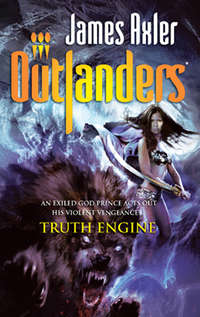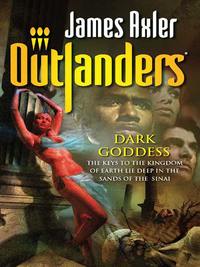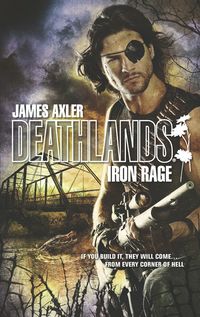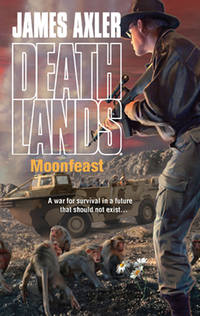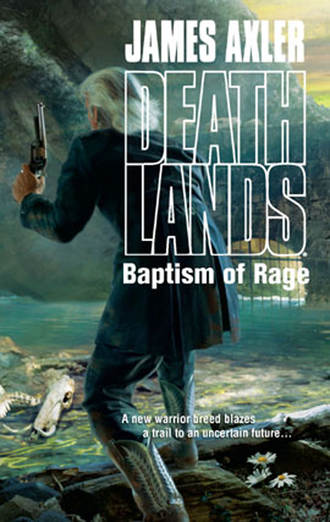
Полная версия
Baptism Of Rage
THE SECOND WAG IN THE convoy was similar to the first, a rusty old truck rig that had been converted to run on moonshine. Krysty had taken the shotgun seat next to a dark-skinned woman called Nisha Adams, who looked permanently tired. Nisha’s husband, Barry, a man in his midforties, with the tanned, leathery skin of someone used to working outside, drove the rig with an easygoing nonchalance, remarking on things that caught his attention at the roadside, keeping his hands in a four- and eight-o’clock grip on the rig’s large wheel.
Three other people shared the cab, sitting in the sleeping compartment behind the main seats—another older couple called Julius and Joanna Dougal, and the old farmer who had been attacked by one of the hounds outside the trading post and now wore a bandage across his wounded arm. The five of them seemed to get along well—they were old friends, full of anecdotes and not above teasing one another in a lighthearted way.
Krysty sat quietly, her green eyes watching the cracked strip of road and the surrounding landscape as they lumbered along, following Croxton’s rig at a steady pace.
“So, where are you from, long and tall?” Julius asked from the back of the cab.
Krysty turned and gave the man a brief smile. He was about fifty, dark-skinned and carrying a few extra pounds around his middle and on his jowls. Whatever he had farmed before he’d downed tools to go on this crazy quest for eternal youth, it had kept him strong and well-fed. “Name’s Krysty,” she began. “I come from a ville called Harmony. Have you heard of that?”
Julius looked thoughtful for a moment, then shook his head. “Can’t say I have, Krysty.”
“It’s in the past,” Krysty said with a shrug. “You folks come from a long way?”
“Couple of days on the road so far,” Joanna explained. Like Julius, she was a dark-skinned woman carrying a few extra pounds. She wore a machete at her hip, its blade notched here and there from use.
“Worth it though,” Julius added. “Imagine, being young again. You live in this hellhole so long and suddenly someone offers you a chance to be young all over again. Strong and healthy again. Can’t even imagine it, I’ll bet, young’un like you.”
Krysty laughed. “I grew up fine and strong, Julius,” she said, “but I still miss some of the things I used to be able to do.”
“Like what, child?” Joanna asked, encouraging Krysty to continue.
Krysty glanced back at the road through the windshield, her eyes scanning the back of the wag ahead and peering at the dead terrain all around. “Dreams,” she said wistfully. “I miss being able to dream the way I did when I was a little girl. That feeling of security that lets you dream just about anything.”
From the back of the rig, the old farmer, Paul Witterson, loosed a loud, braying laugh. “Ha. You’re still a little girl, sweetie,” he said. “Having curves in all the right places don’t change that.”
Krysty smiled, flattered by the old man’s observation. “Thanks for the kind compliment.”
“Compliment nothing,” Witterson stated. “Facts is facts, Red. Facts is facts.”
Gazing through the window to her right, Krysty wondered what the facts were about the spring of eternal life.
THE THIRD VEHICLE in the convoy was a broken-down, American-made four-wheel drive that had survived the nukecaust but not much else. It was patched together with mismatched doors and sheets of metal, and the roof wore the acne-scar evidence of acid raid erosion. The engine had been removed, and that space was used for additional storage, containing almost all of the occupants’ possessions. Despite displaying mutie musculature, the two weary horses that pulled the vehicle looked to be struggling with the weight.
Doc had taken the passenger seat beside the driver, a man in his middle fifties called Charles Torino, whose face was more scarred than the roof of his automobile. Mildred sat in the back, across from Doc, beside Mary Foster, checking the bandage that had been applied to the wound where her shoulder met her neck. A dark-haired woman in her late thirties, Mary was the woman who, along with her baby, had been snagged by the mutie wolf when the companions had first intervened. She was rocking the baby in her arms as Mildred dressed her wound, replacing the bandage.
“Ryan and J.B. think I am crazy, do they not?” Doc said, breaking the silence inside the vehicle.
Mildred looked up from her gentle work on the woman’s wounded neck. “No,” she replied, “don’t be silly.”
Doc’s smile was genuine as he answered. “Do not try to kid an old man, Mildred. I have known you too long. And I know what I saw in their eyes. They think I am out of my mind.”
“Well,” Mildred admitted, “no more than normal, I’m sure.”
Doc looked ponderously out of the missing windshield for a moment before he continued. “How about you, Doctor?” he prompted. “Do you think this old fool is crazy?”
Mildred cast a significant look at the other people in the automobile before she spoke. “Doc, I hardly think now’s the time to…” she began.
“It may be false hope,” he told her, “but you understand what would happen if I did not pursue it. I would not have been able to live with myself knowing that this opportunity may be out there.”
Mildred leaned forward and touched Doc’s shoulder reassuringly. “I know, Doc,” she said, “we all do. No one thinks you’re wrong or loopy. We just worry about you.”
The driver, Charles Torino, spoke in his hoarse, strained voice then, looking over his shoulder through the headrests to take in Mildred as well as Doc. “You folks think this is a wild-goose chase?” he asked.
Mildred shrugged. “I don’t know. It sounds pretty amazing. I guess we have doubts.”
Charles nodded, peering back at his mutie horses to see that they were still on the right track. “I seen it happen,” he said. “Old guy come through our ville two months ago, decrepit, looked like Old Father Time hisself limping along on that bad foot of his. He come and told us about this young-making spring he heard about out east. Said he was going looking for it. Six weeks later he came back.”
Mildred and Doc looked at the man, hanging on his every word.
“He was just a kid,” Charles said in his strained voice. “I mean, mebbe twenty years old, I dunno. Still had the limp he come to the ville with all them weeks before, but he looked young. Real young.”
“And it was the same man?” Mildred asked.
Charles nodded. “I’d swear to you it was. Mary?”
The younger woman holding the baby nodded solemnly. “Same eyes, same jawline,” she said. “S’funny, he looked kinda handsome as a young man.”
“Yet he still had his limp,” Doc wondered.
“Oh, the spring cured that, too,” Charles said with a throaty laugh. “Idiot was so busy dancing with joy he trod on a nail, went right through his boot. Put him pretty much back where he started at, I guess.”
Doc and Mildred both laughed at that, too, feeling a curious sense of relief.
“Me,” Charles continued, his eyes glazing over as he considered his words, “I’m hoping it can cure something a bit meaner than a broken foot.”
Mildred peered at the man and gently asked what he meant.
“I got me the black lung, miss,” Charles said with that throaty voice of his. “The big black crab inside me, making it a blamed chore to breathe.”
Cancer, Mildred realized. The man was looking for a cure for cancer.
RYAN WAS ACTING AS SEC MAN on the fourth vehicle in the convoy—a canvas-covered wooden wag with large wheels, pulled by four weary-looking horses. He sat at the front of the wag, his 9 mm SIG-Sauer P-226 ready at his hip, the Steyr rifle resting at his side. In silence he mentally reviewed his concerns. The whole quest seemed foolish, and yet he felt loyalty to Doc. The man deserved this chance, however unlikely it seemed.
And there was something else. There was a part of Ryan that, blast it all, wanted it to be true. The whole world, it seemed, had been turned against humankind, making every day a battle of desperate survival against astonishing odds. The plants, the wildlife, mutations and even the weather patterns had become poisonous, dangerous or downright lethal to man, and that was before considering the brutality that people inflicted on one another. To discover one bright hope, one good thing in the landscape of badness—that would be nothing short of a miracle.
Ryan and his companions had trekked a long time hoping for a miracle, seeking somewhere to settle, to call home. Babyville wasn’t it, Ryan was sure of that, but it just might rejuvenate the sense of hope that was sorely ebbing deep inside him.
Ryan’s companions in the wag were a family of three—the Cliffords—whose youngest was forty-three years old. A much younger man called Alec shared the back of the horse-drawn wag with the family, apparently shifting across from Croxton’s own wag. Alec was the blond-haired young man Ryan had noticed at the table in the trading post the night before. Alec looked similar to Daisy, the miracle girl who claimed to be over seventy years old, and Ryan suspected that they were brother and sister, or perhaps cousins. Their physical similarity nagged at him. Despite the layers of clothing that Alec wore for the trip, Ryan could see that the lad was rake-thin. Where Daisy still had puppy fat, Alec’s face was slender and bony, sharp planes and narrow, predatory eyes. He had the wispy beginnings of a beard on his chin, which he had clearly cultivated, though its ash-blond color made it seem insubstantial.
While the Clifford family members argued with one another in that way that families will, Alec remained silent, observing everything without comment. In that, Ryan saw something of Jak Lauren in the young man. Jak was a fine man to have on side, Ryan reminded himself, but he was a dangerous foe to turn one’s back on. Ryan wouldn’t be letting his guard down around this blond-haired young man.
J.B. HAD BEEN POSTED as sec man in the final wag in the train. This wag was a converted farm tractor, belching thick, tarry black smoke into the air behind it from two exhaust pipes as it gobbled up a sweet-smelling fuel made from sugar solution. A canvas shelter had been strung across the engine, and a boxed-in trailer had been tagged onto the rear. The Armorer sat in the trailer, watching the road behind them through the aft half-door. Sitting beside him, working his way through an illustrated instruction manual, was Vincent White. Vincent was a man in his midfifties, and he left his wife, Maude, to drive the sputtering vehicle. A naked lightbulb had been wired up into the side of the trailer, and was running off the engine to cast a dim, yellow light inside the box on wheels. He used a magnifying glass to read the print in the booklet he held. The man was desperately farsighted.
The road behind them bumped along, trailing off into the distance, the tragic fields with their skeletal plants sweeping away toward the horizon. J.B. watched the skies where a peppering of carrion birds followed the wag train. Were they simply being hopeful, he wondered, or did the convoy and its passengers have the mark of death upon them?
THE SEARING, NOONDAY SUN beat against the battered, rusting four-wheel drive, highlighting every streak and imperfection scarring the old, broken windshield. Doc sat comfortably in the passenger seat, watching the light playing across the cracks. Beside him, Charles Torino held the reins, urging his tired horses onward with occasional words of encouragement. They were somewhere still in Tennessee. It was scrubland here now, where once farms and thriving towns had been. Crows flew above, cawing discordantly to one another, swooping down to perch on the struggling saplings that had emerged from ashlike soil. When they landed, the soot-feathered crows seemed so heavy as to almost topple the scrawny, young saplings. The crows waited, watching the convoy of wags pass like a jury deliberating its verdict on the accused as they were paraded before them.
Doc closed his eyes, feeling the yellow warmth of the sun beating down through the cracked windshield, painting patterns on the inside of his eyelids. The heat was good, a simple delight harkening back to a more innocent age. Charles was saying something beside him, speaking to his horses, but Doc ignored him, tuning out the man’s throaty voice. Behind him, in the back of the wag, Mildred and Mary were talking about the wildlife, about favorite things, foods and beverages, meaningless stuff to pass the time. Baby Holly snuffled now and then in her sleep.
They were getting slowly closer to Babyville, and its mythical pool of rejuvenation.
Doc thought back to the conversation he had had with Ryan that morning, after he had finished shaving in the dingy bathroom of the inn, and then back to the discussion in the trading post with its tethered goats and tethered dancing girls. The conversation played out in his mind’s eye, Doc himself trying to justify his need to pursue the promise of Babyville.
DOC WAS EXPLAINING Croxton’s proposition to his companions, but J.B. kept dismissing his words, waving his hand in front of his face as though swatting at a fly.
Конец ознакомительного фрагмента.
Текст предоставлен ООО «ЛитРес».
Прочитайте эту книгу целиком, купив полную легальную версию на ЛитРес.
Безопасно оплатить книгу можно банковской картой Visa, MasterCard, Maestro, со счета мобильного телефона, с платежного терминала, в салоне МТС или Связной, через PayPal, WebMoney, Яндекс.Деньги, QIWI Кошелек, бонусными картами или другим удобным Вам способом.



